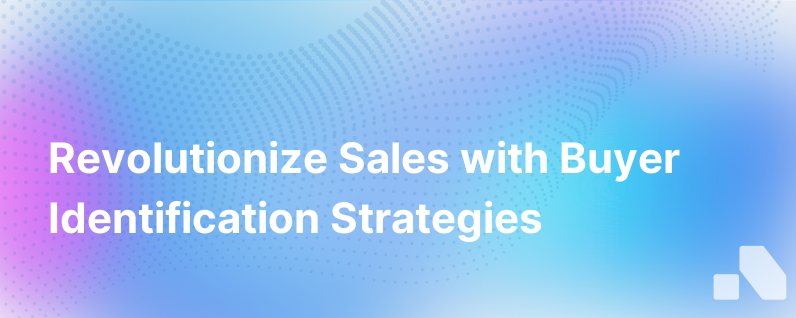
In the realm of B2B sales and marketing, the most successful companies understand an essential truth: they are not in the business of simply providing a product or service; they are in the business of identifying and understanding buyers. This concept echoes the classic business parable asserting that railroad companies who understood they were in the transportation business, rather than the railroad business, adapted and thrived. For modern B2B companies, this means adopting the mindset of a buyer identification machine.
This article is not merely a metaphorical exploration, but rather a strategic discourse, urging a mindset shift that empowers B2B businesses to excel in an ever-evolving marketplace. Dive with me into the analytical and tactical dimensions of becoming a buyer identification powerhouse.
The Buyer Identification Paradigm
Initially, one might assume their business's success hinges on the strength of its product or service offerings. However, the harsh reality remains that even the most revolutionary offerings can languish in obscurity without a meticulous understanding of the buyer.
You're not just a vendor of X product or Y service. You're a sophisticated apparatus that homes in on the needs, behaviors, and pain points of your target audience. This is the crux of buyer identification: employing laser-focused strategies to ensure your solutions meet the right buyers at the right time.
Crafting the Buyer Persona
Buyer identification begins with the granular construction of buyer personas. These semi-fictional representations of your ideal customer must be honed through meticulous market research, first-hand data, and iterative refinement.
Unearth the professional and personal dimensions that influence your buyer's decisions. Consider their goals, challenges, and daily operations. Peel back the layers to grasp the industry influences, budget constraints, and vendor expectations affecting their trajectory.
Data-Driven Targeting
The burgeoning field of data analytics offers a plethora of tools and methodologies to track buyer behavior and preference patterns. Employ sophisticated algorithms and machine learning techniques to segment your audience, predict buying trends, and gauge sales readiness.
It's not enough to simply collect data; you must transform it into actionable information. This involves dedicating resources to clean, analyze, and derive meaningful insights that continuously inform your tactics and strategies.
The Journey to Engagement
Once you've identified potential buyers and gleaned insights into their needs, the journey toward engagement begins. Your marketing and sales teams must collaborate to create personalized experiences that resonate. A buyer is not a static entity, and your approach must reflect the dynamism inherent in the sales cycle.
Utilize targeted content to nurture potential buyers along their journey. Draw from the arsenal of digital marketing—SEO, email campaigns, social media interactions, and more—to engage and propel leads down the funnel with precision-crafted messaging.
Leveraging Sales Enablement Platforms
In the digital age, B2B sales teams require cutting-edge platforms to facilitate buyer identification. Sales enablement tools, such as CRM systems, AI-driven analytics, and account-based marketing software, are not just luxuries; they are necessities. These technology solutions streamline the identification process, providing a competitive advantage in the rapid-paced B2B landscape.
Sales enablement platforms collect real-time data, align sales and marketing efforts, and deliver personalized content to buyers. Combined, these capabilities transform an ordinary business into a buyer identification machine.
Mindset and Cultural Shift
Cultivating a corporate culture that embraces this mindset is imperative. From C-level executives to frontline sales representatives, the organization must align with the philosophy that buyers are the core around which all strategies revolve.
Encourage teams to think beyond the product and delve into the lifeblood of the service—its buyers. Foster a culture of empathy, curiosity, and innovation, with a nimble approach to adapt to buyer evolutions and market shifts.
User-Centered Innovation
Your product might be exceptional, but it’s the continuous adaptation to buyer demands that will maintain its market relevance. Adopt a user-centered design mentality, involving feedback loops with prospects and customers to continuously refine your offering. This stance cements your status as a buyer-centered innovator rather than a mere provider of goods and services.
Case in Point: Aomni as the Enabler
At Aomni, we understand that one of the strongest levers to pull in becoming a buyer identification machine is technology. Our AI-powered platform bestows B2B sales teams with unprecedented capabilities for pinpoint strategic sales decisions.
The platform conducts real-time account research, drawing on actionable competitive insights to drive personalized sales content with minimum effort required. Aomni’s AI navigates the complex data environment, extracting valuable signals on buyer intent and readiness, a task that traditionally drained countless human hours and resources.
Conclusion
In conclusion, transitioning from merely selling a product or service to excelling as a buyer identification machine is about fostering a keen, adaptable understanding of the buyer. It’s about leveraging data, embracing technology, cultivating a buyer-first culture, and continuously reinventing your approach to align with buyer behaviors.
Aomni exemplifies this transformation, offering the intelligence and tools required to drive forward this evolution. Embrace the buyer identification mindset, and let solutions like Aomni amplify your capabilities. Only then can you transcend the limitations of your industry's "railroad" to become an adept purveyor in the business of transportation—figuratively speaking, of course.